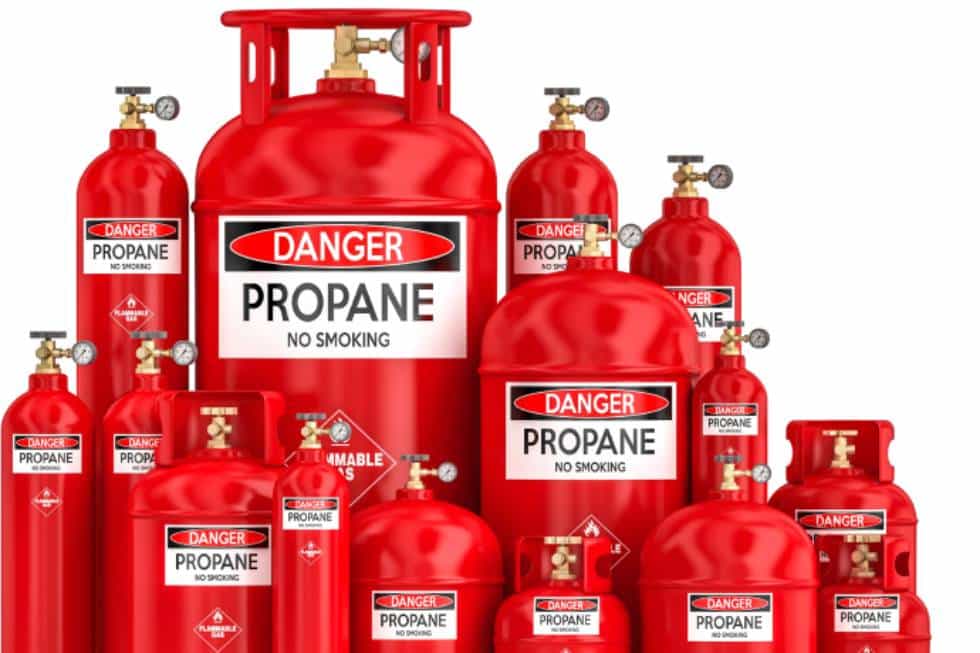In this comprehensive guide, we’ll provide valuable insights and propane safety tips to ensure the wellbeing of both employees and the environment around you. This guide is best for new employees, curious citizens and managers who want to help their team understand the importance of safety in the workplace:
Understanding Propane Cylinder Safety:
Propane cylinders are used for various purposes, from heating and cooking to powering equipment and vehicles. However, mishandling propane cylinders can lead to serious accidents, fires, and even explosions.
To ensure safe propane handling, it’s crucial to follow these propane cylinder safety guidelines:
- Storage and Ventilation: Proper storage of propane cylinders is paramount. Always store them outdoors in well-ventilated areas away from direct sunlight, heat sources, and flammable materials. In colder climates like the Ottawa Valley, ensure cylinders are kept in a cool, dry place to prevent over-pressurization.
- Secure Placement: When storing or transporting propane cylinders, they must be placed upright to prevent leakage. Use appropriate storage racks or stands to prevent cylinders from falling over. In areas prone to earthquakes, secure cylinders with straps or restraints to prevent tipping.
- Regular Inspections: Perform routine inspections of propane cylinders for signs of corrosion, rust, or damage. Damaged cylinders should not be used and must be replaced immediately to avoid leaks and potential accidents.
- Transportation Safety: When transporting propane cylinders, secure them in an upright position in a well-ventilated vehicle. Keep cylinders away from passengers, and never transport them in the trunk of a car. Make sure to turn off the cylinder valves and keep the vehicle well-ventilated during transportation.
Propane Safety Tips for the Workplace:
Implementing a safety-first approach in the workplace is essential to prevent accidents and protect employees. Here are propane safety tips that every workplace should apply the
- Training and Education: Proper training is crucial for employees who handle propane cylinders. Provide comprehensive training sessions that cover proper storage, handling, transportation, and emergency procedures. Make sure employees understand the potential hazards associated with propane and how to respond to emergencies effectively.
- Emergency Preparedness: Establish clear protocols for responding to propane-related emergencies, such as leaks, fires, or explosions. Maintain readily accessible fire extinguishers, emergency shutdown procedures, and first aid kits in areas where propane is used.
- Personal Protective Equipment (PPE): Mandate the use of appropriate PPE, including safety goggles, gloves, and flame-resistant clothing, when handling propane cylinders. This protective gear can minimize the risk of injuries in case of accidents.
- No Smoking Zones: Designate areas where propane is used or stored as strictly no-smoking zones. Prohibit smoking, open flames, and sparks in these areas to prevent ignition of flammable propane vapors.
- Proper Cylinder Handling: Train employees to handle propane cylinders with care. Use proper lifting techniques, and avoid dropping, dragging, or rolling cylinders. Never use cylinders as makeshift tools or supports.
- Leak Detection and Reporting: Educate employees on how to identify propane leaks, such as the distinctive odor of propane or hissing sounds. If a leak is suspected, instruct employees to evacuate the area immediately, shut off the cylinder valve if safe to do so, and report the leak to the designated supervisor.
- Regular Maintenance: Propane cylinders and related equipment should undergo regular maintenance and inspection by qualified professionals. This includes checking for leaks, ensuring proper connections, and verifying the functionality of safety devices.
Conclusion: Prioritizing Propane Safety in the Workplace
Safety should be the cornerstone of any workplace that deals with propane cylinders, whether it’s in the bustling streets of big cities like Toronto and Ottawa, ON or the serene landscapes of smaller towns like Pembroke or Renfrew, ON (located in the Ottawa Valley, where we happen to serve most small businesses with their training and safety needs!).
By adhering to the proper propane cylinder safety guidelines and implementing comprehensive safety measures, employers can create a secure environment for their employees and mitigate the risks associated with propane handling. Remember, propane is a valuable resource, but its potential hazards cannot be ignored. Through education, training, and strict adherence to safety protocols, we can harness the benefits of propane while ensuring the wellbeing of everyone involved.
Realted Video:

